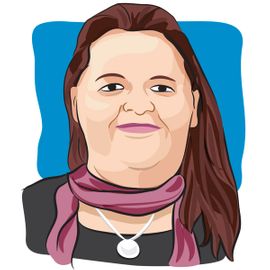- About Us
- Advertise / Support
- Editorial Board
- Contact Us
- CancerNetwork.com
- TargetedOnc.com
- OncLive.com
- OncNursingNews.com
- Terms & Conditions
- Privacy
- Do Not Sell My Information
- Washington My Health My Data
© 2025 MJH Life Sciences™ and CURE - Oncology & Cancer News for Patients & Caregivers. All rights reserved.
Self-Advocacy in Cancer Care Is Vital, Though Often Uncomfortable

Kim was a caregiver for her sister while she battled stage 4 Hodgkin Lymphoma for nearly five years, from diagnosis through an autologous transplant. She turned her experience into change and has since become an activist in finding a cure for cancer. Kim has worked in politics and assisted in the passing of numerous legislative pieces impacting patients with cancer and their families. She is an activist in the field of oncology, nursing and beyond. Additionally, she is a volunteer and champion for a cure with the Leukemia and Lymphoma Society's Light the Night Campaign. Kim has shared her experiences with cancer as a contributor with Cure and through public speaking engagements throughout the United States.
I learned that self-advocacy is not about proving an oncology wrong or deciding that one drug is better than the other. It’s about speaking up for what you think is right.
When my sister was diagnosed with cancer, we often received advice from her care team. Among what I consider to be the most valuable advice we received was self-advocate.
Her primary oncologist was not the one who gave this advice, and at times I think that her oncologist would have rather we had not been told to do so. I do not say that to speak poorly of her care team or limit my gratitude for her oncologist. I say that because, at times, during her cancer treatment, I clashed with her doctor regarding the direction my sister's care should take.
The advice was given by a critical care pulmonary consultant who had treated my sister on many occasions. I was struggling with all the complications that the treatments had caused. This is not to say that any doctor could have predicted the issues that would arise, but my sister was an anomaly, and she had reactions that others did not. What bothered me was even knowing that she was still subjected to treatments that caused more harm than good. That resulted in much more time spent in the hospital than at home, ultimately leading to the stoppage of treatment when the cancer was opportunistic, growing rapidly and uncontrollably.
At that time, I did not have any formal medical training. I had hours spent combing over research regarding monoclonal antibodies and immunotherapies. I wanted different treatments we had been presented with, which was met with much hesitancy by her oncologist.
When we learned she had again fallen back into a pre-diagnosis state and needed something different, he wanted to utilize the monoclonal antibody, Adcetris (brentuximab). I was not a fan of this specific drug because of the risks associated with dosing. While most handled the medication well, a limited number of individuals experienced pulmonary multifocal leukoencephalopathy (PML). I knew the risk was low, but it was hard to overlook the Black Box warning that this drug came with because of how many complications she had already endured.
Despite the advice I had been given to advocate for my sister and myself when making medical decisions, I did not listen. I reluctantly let Adcetris be dosed, and while the first three treatments only caused mild symptoms that could be managed in the clinic and at home, the fourth infusion resulted in an extreme reaction and hospitalization. My sister suffered numerous complications; the worst was photosensitivity, which she still lives with today, amnesia, and PML.
My worst fear was realized, and to this day, I regret not taking the advice given and letting them dose the medication. I was worried about my sister not getting the best care and held my tongue. I should have spoken up and advocated for what I believed was best for her, and I didn't. I understand it is not my fault she had the reactions and complications she did, but that does not change the guilt and regret I still carry today for what she endured and all that happened.
After this event, I was a better advocate for her. I fought for Opdivo (nivolumab). This immunotherapy drug resulted in remission and allowed her to receive an autologous bone marrow transplant.
The lesson learned was not that I was right, and he was wrong, or that one medication was better. What it taught me was the importance of advocacy. Advocating for my sister and using my voice was not something that should not be done at the discomfort of her care team. It needed to be done because what was best for her was far more important than anything else.
For more news on cancer updates, research and education, don’t forget to subscribe to CURE®’s newsletters here.
Related Content:



